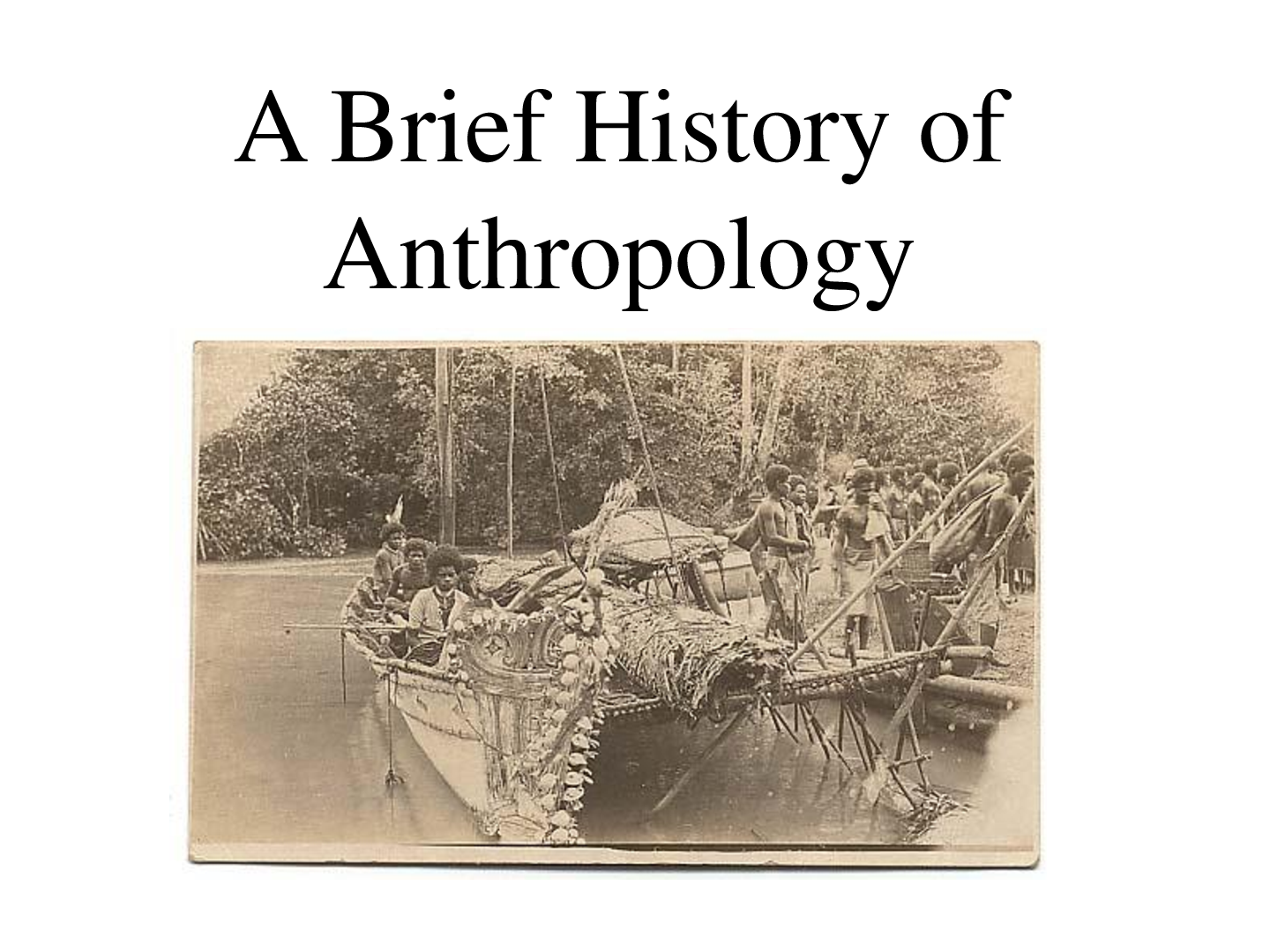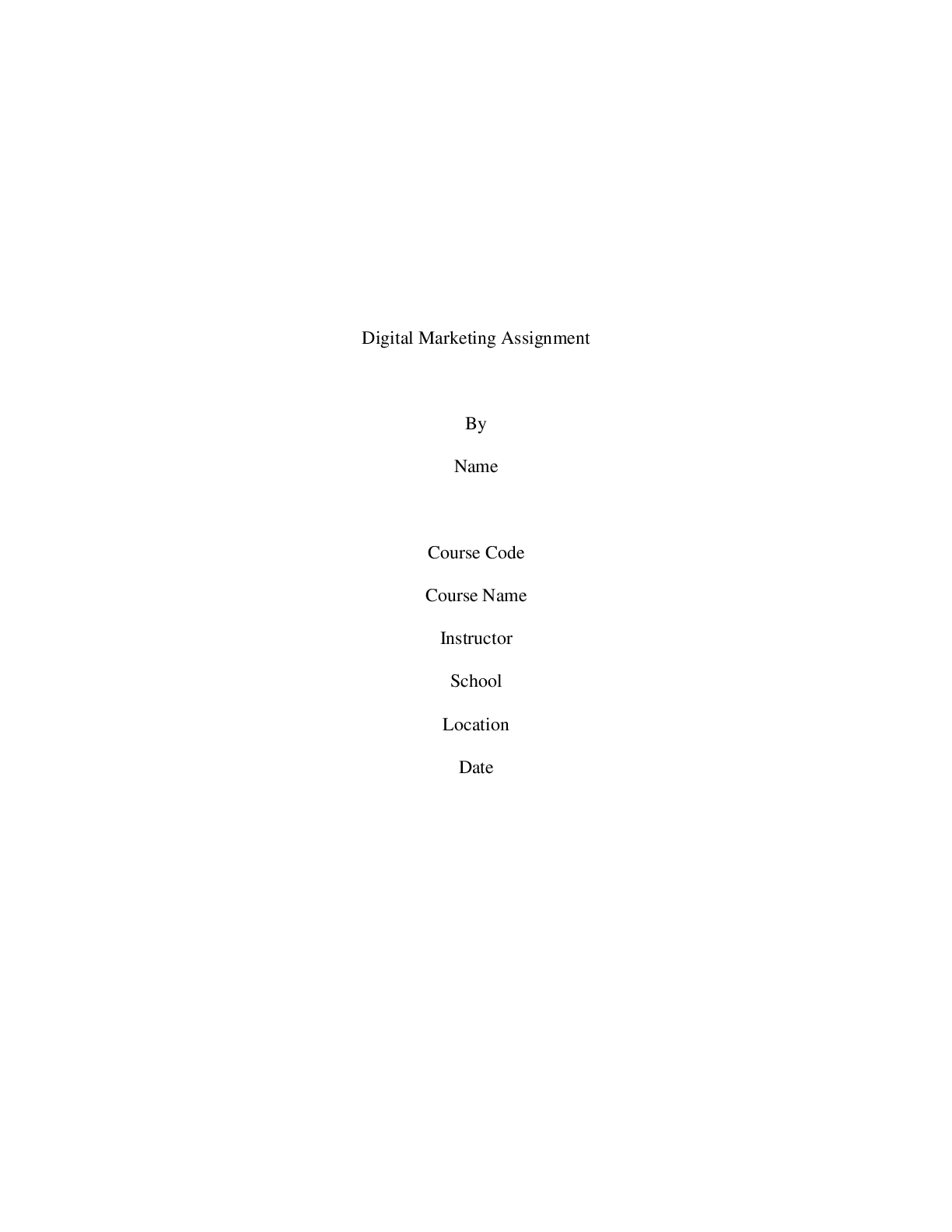Anthropology > Class Notes > A Brief History of Anthropology and How the Culture Concept Developed in Anthropology? Notes and Pr (All)
A Brief History of Anthropology and How the Culture Concept Developed in Anthropology? Notes and Presentation. No Plagiarism
Document Content and Description Below
How the Culture Concept Developed in Anthropology? A Brief History of Anthropology Industrial Revolution Science Positivism Rationalism – Reason Rapid Change Progress Christianity under attack Age o... f Empire Philosophy of History 19th Century Characteristics With the industrial revolution literally steaming ahead the 19th century was a century of rapid change Precursors to Anthropology • Early Evolutionary Frameworks • American Historical Particularism • British Structural Functionalism • Culture and Meaning To the Victorian mind it was far better to be civilized than to be a “savage” Anthropology Emerges • Hobby of Wealthy Scholars, 19th C • Wrote Travel Diaries • Armchair Anthropologists • Read Each Others Accounts • 19th Century Anthropologists Constructed Evolutionary Frameworks to Explain Cultural Differences Early Evolutionary Frameworks • E. B. Tylor-Great Britain • Lewis Henry Morgan – US • Sought to professionalize anthropology • Colonizers and Missionaries had gathered lots of information • Not scientific • Armchair Anthropology • Charles Darwin: Theory of Biological Evolution • Social scientists tried to adapt this to study the Evolution of Human Culture • Unilineal Cultural Evolution E. B. TylorEarly Evolutionary Frameworks • Edward Burnett Tylor (1832-1917) • Primitive Culture 1871-Book • Definition: “culture or civilization, taken in its wide ethnographic sense, is the complex whole which includes knowledge, belief, art, morals, law custom and any other capabilities and habits acquired b y man as a member of society‖Early Evolutionary Frameworks • Culture for Tylor: Unified complex system of ideas and behavior • Transmitted from generation to generation • Shared by members of a group • Set stage for the systematic and scientific study of culture through multiple theories and methodological traditionsAnthropology: A Branch of History `the history, not of tribes or nations, but of the condition of knowledge, religion, art, custom, and the like among them' (Tylor 1871 I: 5). "no conception can be understood except through its history is a maxim which all ethnographers may adopt as a standing rule". (Tylor 1871). `the past is continuously needed to explain the present and the whole to explain the part' (Tylor 1865: 2). `there seems no human thought so primitive as to have lost its bearing on our own thought, nor so ancient as to have broken its connection with our own life' (Tylor 1871) Looking over a collection of their [quaternary man's] implements and weapons on a museum shelf we may fairly judge by analogy that in their moral habits, as in their material arts, they had much in common with the rudest savages of modern times, users like them of chipped stone and flint.” (T The condition of savage and barbarous tribes often more or less fairly represent stages of culture through which our own ancestors passed long ago Early Evolutionary Frameworks • Unilineal Evolution- Stage Theory of Human Evolution – Progressive – Unidirectional – Similarities between cultures through independent invention; autochthony • Artificial Continuum: Savage- Barbarian- Civilized • Cultural Construction vs. Science: – Modelers: “Civilized” – Those being modeled: Savage, Barbarian – How might such a model be used during the last quarter of the nineteenth century? – Overcoming certain racist tropes, reinforcing others A present day society in the stage of Barbarism (e.g. Hawai’i or Samoa) could shed light on the distant past when northern European society was in the stage of Barbarism just as an Australian Aboriginal society could inform Europeans of their history in the stage of Savagery Uniformitarian principle The same kind of development in culture which has gone on inside our range of knowledge has also gone on outside it, its course of proceeding being unaffected by our having or not having reporters present it is desirable to work out a systematically as possible a scheme of evolution of this culture along its many lines” Among evidence aiding us to trace the course which the civilization of the world has actually followed, is that great class of facts to denote which I have found it convenient to introduce the term “Survivals John Ferguson McLennan, (1827-81) 1865 Primitive Marriage: An Enquiry into the Origin of the Form of Capture in Marriage Ceremonies Assumptions of Nineteenth Century Evolutionism 1. Like the natural world the cultural world is governed by laws that science can discover. 2. These laws operated on the distant past as they do on the present. - Uniformitarianism 3. The present grows out of the past by a continuous process - developmentalism CRITIQUE OF EVOLUTIONISM 1. Is the Central Tenet Valid? 2. Is it Ethnocentric? 3. Did the Data support the theory? Alternative Theories and Challenges to Social Evolution: • 1. Historical Particularism (US) • 2. Structural Functionalism and Functionalism (Great Britain) • 3. Functionalism (biological needs as the base of function), Structural Functionalism (social life Explorers and travellers were replaced by government officials and missionaries who formed a closer association with the people they were in contact with A typical piece of intensive work is one in which the worker lives for a year or more among a community of perhaps four or five hundred people and studies every detail of their life and culture; in which he comes to know every member of the community personally; in which he is not content with generalized information, but studies every feature of life and custom in concrete detail and by means of the vernacular language. The Division of Labour in Society 1893 Rules of the Sociological Method 1895 Suicide 1897 Elementary Forms of the Religious Life, 1912 What is a Social Fact? A social fact is every way of acting, fixed or not, capable of exercising on the individual an external constraint; or again, every way of acting which is general throughout a given society, while at the same time existing in its own right independent of its individual manifestations The root idea in functionalism BRONISŁAW MALINOWSKI 1884 born in Kraków, Poland, then part of the Austro-Hungarian Empire 1910: emigrates to England to begin postgraduate work in anthropology at the LSE 1912 receives a Ph.D from the LSE for a library dissertation on the Australian aborigines The goal [of the Ethnographer] is, briefly; to grasp the native's point of view, his relation to life, to realise his vision of his world” P. 25 Perhaps through realising human nature in a shape very distant and foreign to us, we shall have some light shed on our own. P. 25 Various Institutional Functions FIVE BASIC PRINCIPLES Society is seen as an organically structured whole akin to a biological organism. 2. Society has a social structure - an ordered arrangement of parts. 3. Structure is ideally integrated, unified, and exists in equilibrium. 4. This structure is the object of analysis; the most valued CRITIQUE OF FUNCTIONALISM What is the Functionalist view of Human Nature? What is the Relationship between the individual and the society? How do Functionalists account for change? How do functionalists deal with conflict? Boas’ study: earliest anthropological attempt to describe a non-European ‘ethno-science’ in phenomenological terms Geographic research on the impact of the physical environment on native Inuit migrations Analyst seeks to understand phenomena by grasping how they make sense within the framework of the subject’s thought-world i.e. relatively 1885: First expedition to Northwest Coast (Bella Coola) 1886: First collecting trip for American Museum of Natural History (New York City) to Nootka and Anti-Evolutionist Evolutionism assumes what it is trying to prove Order of cultural traits is arbitrary, eg representative and geometric art forms Three pillars explain cultural customs 1. Cultures can only be understood with reference to their particular historical development. Therefore each culture is unique 2. Environmental conditions 3. Individual psychological factors BOASIAN CONCEPT OF CULTURE FRANZ BOAS: Key Themes Cultural/historical particularism “race, language, and culture” as independent variables Relativism superorganic Alfred Louis Kroeber (1876-1960) 1897 enrolled in a course in American Indian languages at Columbia University offered by Franz Boas 1901 completed his dissertation on symbolism in Arapaho art in Montana and received the first doctorate in anthropology to be awarded by no culture is wholly intelligible without reference to the non-cultural or so-called environmental factors with which it is in relation and which condition it" (Kroeber, 1939: 205) “The superorganic or superspsychic or super-individual that we call civilization appears to have an existence, an order, and a causality as objective and as determinable as those of the subpsychic or inorganic” Alfred Kroeber Culture Areas Superorganic Deterministic First American Textbook in anthropology (1923) Coming of Age in Samoa 1926 Is adolescence a universally traumatic and stressful time due to biological factors or is the experience of adolescence dependent Margaret Mead and Samoa: The Making and Unmaking of an Anthropological Myth (1983) Mead did not spend enough time in Samoa and lived in naval dispensary with an American family rather than in a Samoan household sought to discover extent temperamental differences between the sexes were culturally determined rather than innate biological Characteristics of Mead’s anthropology Relativism Ahistorical Holistic Participant observation Patterns of Culture 1934 Demonstrated the primacy of culture over biology in understanding the differences between people Zuni Wealth is a sign of greediness. Individual fame is a sign of selfishness Kwakiutl Overbearing Vigorous Zest for life Strive for ecstasy in ceremonies Why are they so different? Can’t be “fixed human nature.” Why not? Suppose - Newborn Zuni baby is raised by Kwakiutl parents (or vice versa). How would this baby behave when he or she becomes adult? Like their adopted Culture and Personality “We have seen that any society selects some segment of the arc of possible human behaviour”… and in so far as it achieves integrations its institutions tend to further the expression of its selected segment and inhibit opposite expressions”. Culture and Personality - Critique [Show More]
Last updated: 2 years ago
Preview 1 out of 98 pages

Buy this document to get the full access instantly
Instant Download Access after purchase
Buy NowInstant download
We Accept:

Reviews( 0 )
$4.00
Can't find what you want? Try our AI powered Search
Document information
Connected school, study & course
About the document
Uploaded On
Feb 10, 2020
Number of pages
98
Written in
Additional information
This document has been written for:
Uploaded
Feb 10, 2020
Downloads
0
Views
1425














